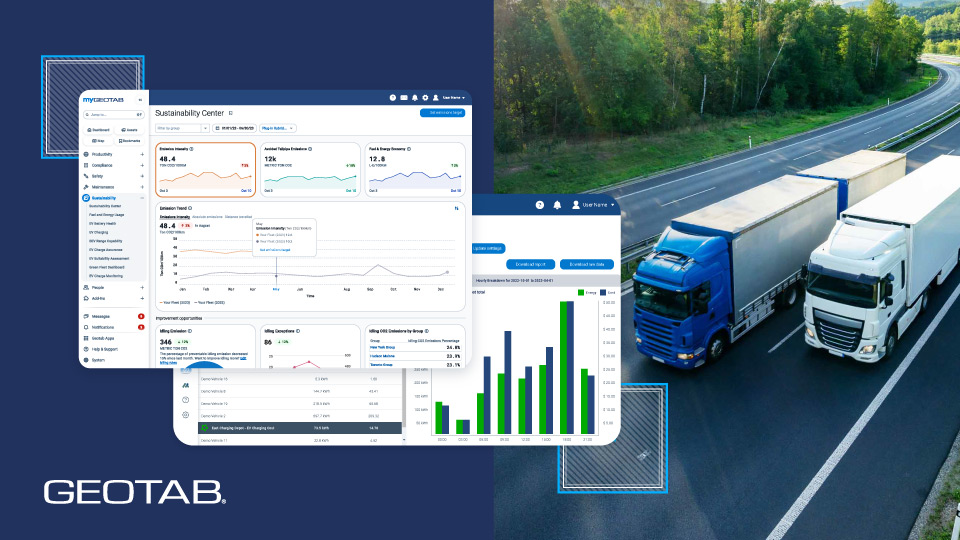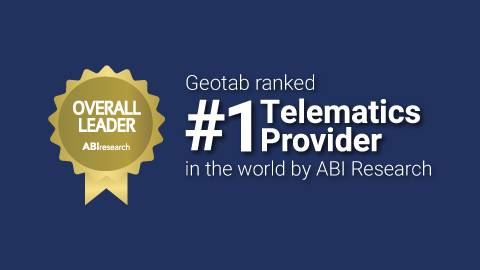
Geotab introduces EV Battery Degradation Tool, providing assessment and comparison of electric vehic
Published on January 15, 2020
Aggregated data from 6,300 vehicles reveals that EV batteries may outlast usable life of vehicle

Geotab Connect 2020 - San Diego, CA – January 15, 2020 - Geotab, a global leader in IoT and connected transportation, today announced the launch of its EV (Electric Vehicle) Battery Degradation Tool which, through aggregated data collected from 6,300 electric vehicles (EVs), offers a comparison and assessment of battery health in EVs over time. Announced at Geotab Connect 2020, the easy-to-use tool leverages data processed from EVs representing 64 makes, models and years to help showcase how real-world conditions influence battery health. The findings suggest that if degradation rates remain constant, most batteries will outlast the usable life of the vehicle and go on to provide energy storage for many more years.
Electric vehicle battery health has a direct impact not only on maximum usable range over time but also the vehicle’s residual value. Geotab’s EV Battery Degradation Tool examines real-world performance of EVs over time and provides a detailed comparison across different makes and models to help facilitate informed purchasing decisions.
“Considering we are in the early stages of EV adoption, the health of the battery has been a top concern for fleet owners and individuals,” said Matt Stevens, VP Electric Vehicles at Geotab. “From a life-cycle perspective, battery health is key since it is the most expensive component in an EV and impacts vehicle range. With Geotab’s free EV Battery Degradation Tool, fleet operators, early EV adopters and those considering the purchase of an EV will have the information they need to make more informed driving, maintenance and buying decisions moving forward.”
A brief overview of Geotab’s findings:
- If current degradation rates are maintained, the vast majority of batteries will outlast the usable life of the vehicle.
- The average decline in energy storage is 2.3% per year. For a 150-mile EV, owners are likely to lose 17 miles of accessible range after five years.
- Batteries with good thermal management show slower degradation.
- Battery-powered vehicles with bigger state-of-charge buffers result in a longer lasting battery pack.
- Higher vehicle use does not necessarily equal higher battery degradation.
- Vehicles driven in hot temperatures show a faster decline in battery health.
- The use of direct-current (DC) fast-chargers appears to speed up the process of degradation but there is not much difference in battery health based on frequent use of Level 1 versus Level 2 charging.
“As the world’s largest commercial telematics company, Geotab is committed to providing its customers and partners with cutting-edge solutions that deliver actionable results,” added Stevens.“Together with our global ecosystem, we are focused on consistently delivering on our promise to help businesses improve vehicle performance and safety, increase productivity and reduce environmental impact.”
Founded in 2000, Geotab processes over 40 billion data points a day from more than 2 million connected vehicles across the globe. Named the top commercial telematics provider worldwide by ABI Research, Geotab is a proven leader in IoT and connected transportation, providing actionable insights to businesses of all sizes in order to help them better manage fleets and make data-driven decisions. Geotab’s key industry differentiator is its open platform solution, which promotes a network of cooperation, enabling businesses to integrate Geotab data into any system regardless of business size or operational needs.
For more information on Geotab’s EV Battery Degradation Tool, including how to access it, visit: https://www.geotab.com/au/blog/ev-battery-health/
Media Contact
Nicole Riddle
Senior Specialist, Strategic Communications
pr@geotab.com
About Geotab
Geotab is a global leader in connected vehicle and asset solutions, helping fleets boost their efficiency and management. We use advanced data analytics and AI to transform fleet performance, safety, and sustainability, reducing costs and driving efficiency. Supported by top data scientists and engineers, we serve over 55,000 customers worldwide, processing 80 billion data points daily from more than 4.7 million vehicle subscriptions. Geotab is trusted by Fortune 500 companies, mid-sized fleets, and the biggest public sector fleets globally, including the US Federal Government. Committed to data security and privacy, we hold FIPS 140-3 and FedRAMP authorisations. Our open platform, network of excellent partners, and Marketplace deliver hundreds of ready-to-go third-party solutions for fleets. This year, we're celebrating 25 years of innovation. Find out more at www.geotab.com/au, and follow us on LinkedIn or visit our blog.
Related posts

Geotab Releases 2024 Sustainability and Impact Report: Profitable Sustainability
March 26, 2025

Geotab Announces Sustainability Center and EV Charge Monitoring for Improved Fleet Efficiency and Energy Cost Control
February 26, 2025

Data Advances Decarbonisation in Connected Transportation: Geotab's Sustainability Report Reveals Progress, Recognises Challenges Ahead
April 4, 2024
Recent News

Geotab Releases 2024 Sustainability and Impact Report: Profitable Sustainability
March 26, 2025

ABI Research Ranks Geotab #1 Global Commercial Telematics Vendor for Fourth Consecutive Year
February 27, 2025
.jpg)
Driver Risk Insights in Geotab Safety Center Help Fleets Prevent Collisions
February 26, 2025

Geotab Announces Sustainability Center and EV Charge Monitoring for Improved Fleet Efficiency and Energy Cost Control
February 26, 2025
